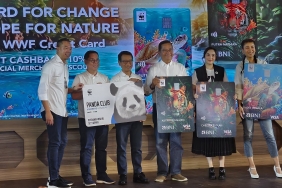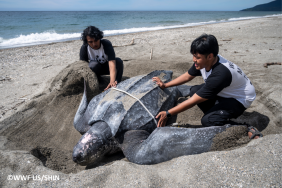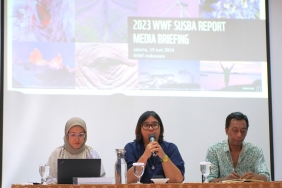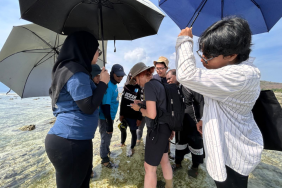"TREES FOR LIFE" COMMUNITY-BASED FOREST TREE PLANTING PROGRAM TO SUPPORT ECOSYSTEM RESTORATION IN SEBANGAU-KATINGAN, CENTRAL KALIMANTAN
Mangara Village, October 30, 2024. WWF-Indonesia in collaboration with PT Indonesia Epson Industries, launched the "Trees for Life" initiative by planting 300 hectares of trees in Tumbang Mangara and Tumbang Kawei Villages, Katingan Regency, Central Kalimantan. This initiative is an effort to support government programs in forest and land restoration by replanting and enriching forest area species with local seedlings. Through a community-based forest restoration approach, the planting is supported by the Katingan Hulu Production Forest Management Unit (KPHP), which assists in regular monitoring of the success of this initiative together with the Mangara Kawei Community Forest manager. This initiative is expected to balance restoring forests that serve as habitats for endangered orangutans and optimizing the environmental and socio-economic needs of the communities that will benefit from the results of these forest and landscape restoration activities.
The SEKA - Sebangau Katingan landscape is an ecologically important area for the people of Central Kalimantan, as well as its biodiversity. With 2.35 million hectares of forest or 15% (or 15.3 million hectares) of forest cover in all of Central Kalimantan, local communities depend on the integrity of their forest cover. Through the availability of clean water, clean air, and food availability.
Through Forest Landscape Restoration (FLR) and tree planting, this approach aims to restore degraded areas, restore biodiversity, support the well-being of local communities, and mitigate the impacts of climate change.
Dewi Lestari Yani Rizki, Conservation Director of WWF-Indonesia said, "WWF-Indonesia is committed to contributing to restoring the Seka Landscape in Central Kalimantan. The Seka Landscape is an important habitat for endemic wildlife, safeguarding the lives of indigenous peoples, and local communities and also inhibiting the rate of climate change by sequestering carbon. Dewi continued, "WWF-Indonesia is an organization that is based on science and prioritizes solutions, tree planting is a solution to efforts to restore the Seka Landscape and also the active participation of parties such as PT. Indonesia Epson Industry is very important and can be an example for other companies that want to participate in ecosystem restoration efforts."
Sebangau-Katingan, covering 2.35 million hectares, is one of the last strongholds for Bornean orangutans. To ensure the survival of the approximately 1.1 million hectares of intact forest that is home to thousands of orangutans, restoration efforts are urgent. By reconnecting fragmented forests, we can create thousands of hectares of safe corridors for wildlife to move and forage.
This restoration initiative focuses not just on the numbers, but also on the people behind it. Involving around 300 families in Mangara and Kawei villages, the project encourages a community-based approach. Through training and capacity building, communities will be equipped with the skills to manage nurseries, plant 200,000 trees in a 300-hectare area, and maintain the restored areas. By creating alternative economic opportunities, such as agroforestry, we can reduce pressure on the forest and improve the welfare of hundreds of families.
"We at Epson believe that sustainability is not just a responsibility, but part of our identity. Through collaboration with WWF-Indonesia, we want to show that partnerships between the business sector and environmental organizations can have a real positive impact," said Emile Pattiwael, President Director of PT Indonesia Epson Industry. Adds Emile "We are committed to continue working with various parties to achieve common sustainability goals. Epson believes that technology and innovation should be used to create positive change, not only for the environment but also for Society,".
Epson's commitment to environmental preservation is reflected in the technology we present. One of them is the heat-free technology in our printers, which significantly reduces energy consumption and produces less carbon emissions. In addition, Epson strives to increase local contribution through products with Tingkat Komponen Dalam Negeri (TKDN) standard, supporting sustainable economic growth in Indonesia. In line with the vision of sustainability, Epson has also reduced the use of single-use plastics across operations and encouraged product recycling, ensuring that our environmental footprint remains minimal.
This forest and landscape restoration initiative is expected to restore hundreds of hectares of forest in the Sebangau-Katingan landscape corridor, absorb and store carbon dioxide to mitigate climate change, improve groundwater quality, and reduce the risk of natural disasters such as floods and landslides. In addition, forest restoration will also contribute to increased biodiversity, including Bornean orangutan (Pongo pygmaeus) populations.
For more information, please contact:
Karina Lestiarsi, Communication Officer |+62 852 1816 1683 | klestiarsi@wwf.id
About WWF-Indonesia
WWF-Indonesia is a civil society organization with a local legal entity and global network, supported by more than 100,000 supporters. Our mission is to stop the degradation of the earth’s natural environment and to build a future in which humans live in harmony with nature, by conserving the world's biological diversity, ensuring that the use of renewable natural resources is sustainable, and promoting the reduction of pollution and wasteful consumption. For the latest news, visit www.wwf.id and follow us on X (Twitter) @WWF_id | Instagram @wwf_id | Facebook WWF-Indonesia | Youtube WWF-Indonesia | Line Friends WWF Indonesia





